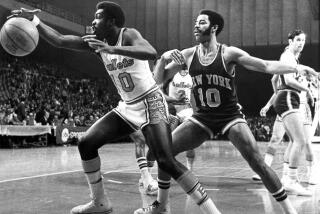Tarpley Winks at Trouble
- Share via
Roy Tarpley Jr., power forward-center for the Dallas Mavericks, is so good, the Lakers once considered giving up James Worthy for him. Fortunately, Laker General Manager Jerry West threatened to quit if they went through with it.
But Tarpley can play. He was the first-round choice of the Mavericks out of Michigan, and he gives them muscle where they need it. He is no Michael Jordan around the basket, but he is no bricklayer, either. They voted him the Sixth Man Award in ‘88, which meant he was the best off the bench in the league, in the view of those who covered the game most. He gets you the ball, almost 1,000 rebounds in his first full year.
Almost 7 feet tall, almost 250 pounds, he is a fairly dominating figure in the pivot. He gets several thousand dollars a minute--$9 million over five years. But the club takes no nonsense from him. Roy Tarpley is a two-time loser in the drug sweep, but when he went missing for 24 hours recently, didn’t show up for a practice and a mandatory AA meeting, the club threw the book at him. A $250 fine.
Still, when Tarpley got picked up for drunken driving and resisting arrest by the Dallas police the other day and he was shown on TV being hustled out of the police station after posting bond, I was not quite ready for his reaction. I thought he might weep, sob, protest his innocence, charge police brutality or even show some embarrassment.
He winked.
You heard me. He blinked an eye and cocked the corner of his mouth.
Now, you and I know what a wink is. The time-honored way of signaling to the gang that this is just a big joke. There’s cayenne in the soup, or a rubber mouse in the bed, or that cigar is about to explode. A wink indicates that you’re putting one over on the world. Get ready for a yuk. Watch this.
Given the circumstance that he was on TV, you might have expected Roy to come gravely on camera with a contrite, sober plea for forgiveness, understanding, a repudiation of what he had done, a promise not to do it again. You may recall that Dexter Manley said, in similar circumstances, “I have made a grave mistake and showed extremely poor judgment by slipping up.”
Not Tarpley. He winked.
A few of us happened to be watching down in Dallas as Roy came on the evening news that night and the consensus was, either we didn’t understand the situation--or Roy didn’t.
Here was the picture: In July of 1988, Tarpley, who led the league in rebounds by a rookie, was enrolled in the NBA’s watchdog drug agency, ASAP (Adult Substance Abuse Program) for alcohol and cocaine dependency. He had a smash season after that, 959 rebounds and an average of 13.5 points playing only 28.5 minutes a game.
In January of 1989, Tarpley who had been put on ASAP’s random drug-testing program, tested positive again and was reinstalled at the ASAP treatment center in Van Nuys. Strike 2.
He returned to the team April 12, after a 49-game absence. He averaged 22.7 points and 13.3 rebounds the rest of the season, playing only 33.7 minutes a game. The club gave him a three-year extension on his contract.
On Oct. 27, Tarpley missed a practice and an AA meeting and was out of touch with everybody for 24 hours.
Oddly enough, Tarpley hadn’t missed practice Nov. 16. But he had missed a few things the night before--like the freeway buttons, the tailgating law and, apparently, the law against drinking and driving. The Dallas police said he was drunk. It took six of them to arrest him, so they added resisting arrest. Tarpley is used to double-coverage.
It was a violation of his after-care program, which prohibits alcohol as well as drugs. In jail, he submitted to a blood test. Fortunately for him and the Mavericks, it showed no more than alcohol. Had it shown other drugs, Tarpley would have been banned for life.
As it is, Tarpley is under suspension, but not by the Dallas Mavericks. ASAP, which has that authority from the league, did the suspending. Its medical director gravely announced that Tarpley was indefinitely suspended until he showed readiness to abide by the terms of his after-care program.
On the face of it, it wouldn’t appear to be anything to wink at.
And then, there is that contract. Roy is supposed to be getting $9 million for the next five years, guaranteed. But while he’s under suspension, he is getting nothing.
And Tarpley winks? Either we don’t understand the situation, or he doesn’t.
More to Read
All things Lakers, all the time.
Get all the Lakers news you need in Dan Woike's weekly newsletter.
You may occasionally receive promotional content from the Los Angeles Times.






